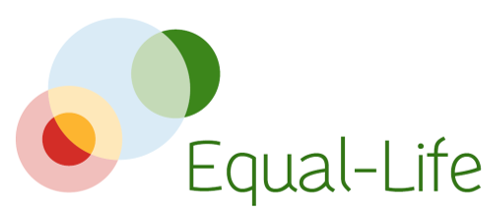Equal-Life
Early Environmental quality and life-course health effects
Early Environmental quality and life-course health effects

“The Equal-Life project addresses the effects of the environment on the cognitive development and mental health of children and adolescents from birth to 21 years of age. Exposure shall include the physical and social environment and indicators of exposure and/or disease. The concept of combined exposure is called exposom. Mediators on the path from exposure to effects, namely stress, sleep and the ability to cope with problems, are also discussed. In order to identify mechanisms, data from eleven cohort and school studies shall be analysed.”
Official Website of the Project: https://www.equal-life.eu/en
The Equal-Life project aims at developing and testing data on combined exposure of children and assessing the impact of this exposure on the child’s mental health and cognitive development. In doing so, new approaches will be used to assess multimodal exposure. The combination of data from existing cohort studies with new data sources will provide insight into physical and social aspects of exposure that have not been addressed so far. This will be done at different levels and within different timeframes, considering the distribution of exposure across social groups based on gender, ethnic and social vulnerability.
The project operates in ten work packages:
The National Institute of Public Health (NIJZ) actively participates in work packages 1, 4, 8, 9 and 10. The contents of these clusters include: mechanisms to identify the link between expos and early indicators of mental health, social exposure, stakeholder involvement and development of measures, development of tools, implementation of training and introduction of novelties. Work Package (WP) 10 includes project management, ethical aspects and dissemination of information. We will assess the role of potential mediators (stress, sleep, problem management), in relation to social and environmental risks, protective factors, mental health, cognitive development, depending on the development phase of the child. To the greatest extent, the NIJZ will be included in WP 4 which covers policy equity analysis and impacts on parents and children from different population groups. Health impact assessments of different sectors of relevance will be carried out.
EQUAL-Life is a five-year project worth EUR 194.421.96.25. It is based on a consortium of 22 partners with multidisciplinary knowledge and experience from 11 countries.
It is important for the National Institute of Public Health (NIJZ) that employees from the Centre for Health Ecology and the Centre for the Study and Development of Health are involved in this project. At the level of Slovenia, however, cooperation is important due to the possibility of contact at international level. Expert consultation, exchange of views and the possibility to influence the development of new guidelines and policies at national level is important.
The NIJZ participated in the organisation of the annual meeting, which was held in Ljubljana. The meeting was of a hybrid nature. At the same time, we organised a meeting of stakeholders.
We participated in a co-creation meeting of stakeholders in Skopje and at the Stakeholder Forum in Milan. All tasks are carried out in conjunction with Work Packages 8 and 9. We attended a meeting of the Ehen Project Exposome Network in Barcelona. At the INTERNOISE Congress in Glasgow, we participated in the organisation and management of the section, where we highlighted environmental noise and impacts on children’s health. We participated in the creation of a website (toolkit/toolbox) where information and tools will be available to help researchers in research and spatial planners to intervene in the environment and to prepare new spatial policies for a supportive environment for children and young people.
In 2021/22, we devoted most of our time to the of Social Exposome task, where we assessed the policy of environmental noise and spatial planning in Slovenia, especially through the prism of social inequalities caused or prevented by these policies.
We produced the report titled Deliverable D 4.5 Equity Impact Assessment of Policies and prepared a contribution for the ICBEN 2023 Congress, which took place in Belgrade in June 2023.
The expected outcome of the project is tools and guidance that will help researchers, decision-makers and other stakeholders to ensure the planning of a supportive environment for all children and young people in individual settings and stages of their development.
Project Duration: 1 January 2020–31 December 2024 (with a possible extension of 6 months, until June 2025)
Supporting Organisation: National Institute for Public Health and the Environment (RIVM), The Netherlands
Project Partners:
Funding: This project has received funding from the European Union’s Horizon 2020 Research and Innovation Programme under Contract No [874724].